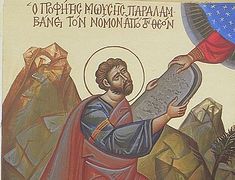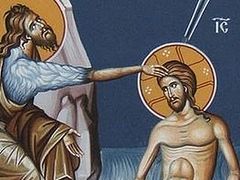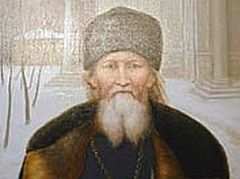One day a certain lawyer asked Jesus, tempting Him: Which is the great commandment in the Law? (Mt. 22:36). And with His answer, the Lord gave the key to every commandment of the Law in general. He said: Thou shalt love the Lord thy God with all thy heart, and with all thy soul, and with all thy mind. This is the first and great commandment. And the second is like unto it, Thou shalt love thy neighbour as thyself (Mt. 22:37-39). Our task is not to fulfill this or that commandment, but to make love the heart of our every deed.
Our deeds themselves can sometimes look very contradictory. It is said: Honour thy father and thy mother (Ex. 20:12), but St. Theodosius of the Kiev Caves left for a monastery despite his mother having forbade it. It is said: He that loveth father or mother more than Me is not worthy of Me (Mt. 10:34), but at his mother’s request, St. John Chrysostom delayed his departure from the world until after her repose. The Law commands a husband not to leave his wife, but immediately after his wedding, St. Alexis the Man of God secretly left both his young wife and his home altogether. Bishops are instructed not to leave their flock, but St. Paulinus of Nola left the people entrusted to him for quite some time, selling himself into slavery in order to free just one person. The Apostle Paul wrote: Give none offence, neither to the Jews, nor to the Gentiles, nor to the Church of God (1 Cor. 10:32), but St. Simeon the Stylite tied a rope around his body so tightly that it began to putrefy and spread such a stench that they even kicked him out of the monastery. And how many examples do we know of how other ascetics violated Church law by publicly eating meat during Lent to stop people from glorifying them. One accepts death rather than renounce Christ, and another says: I could wish that myself were accursed from Christ for my brethren, my kinsmen according to the flesh (Rom. 9:3). Who is the judge of them all, if not the Lord, Who alone sees their hearts, and Whom they have loved with all their souls and with all their minds?
Ever acting out of love, he walks through life as if on a razor’s edge: We are troubled on every side, yet not distressed; we are perplexed, but not in despair; Persecuted, but not forsaken; cast down, but not destroyed; Always bearing about in the body the dying of the Lord Jesus, that the life also of Jesus might be made manifest in our body. For we which live are always delivered unto death for Jesus' sake, that the life also of Jesus might be made manifest in our mortal flesh (2 Cor. 4:8-11).
And why is love born in one man and not in another? The Apostle writes that for some, the god of this world, that is, the devil, hath blinded the minds of them which believe not, lest the light of the glorious gospel of Christ, Who is the image of God, should shine unto them (2 Cor. 4:4), and for others, God, Who commanded the light to shine out of darkness, hath shined in our hearts, to give the light of the knowledge of the glory of God in the face of Jesus Christ (2 Cor. 4:6). But it’s not God we should be asking why He allowed some to be blinded and commanded others to see, for God says to everyone: Thou shalt love the Lord thy God with all thy heart, and with all thy soul, and with all thy mind, and also: Thou shalt love thy neighbour as thyself. The Lord appeals to everyone because everyone is endowed with freedom, and with God’s help can do anything. And it’s not for some unknown reason, but only by his own free will that one man allows himself to be blinded, while another reaches for enlightenment and light.




